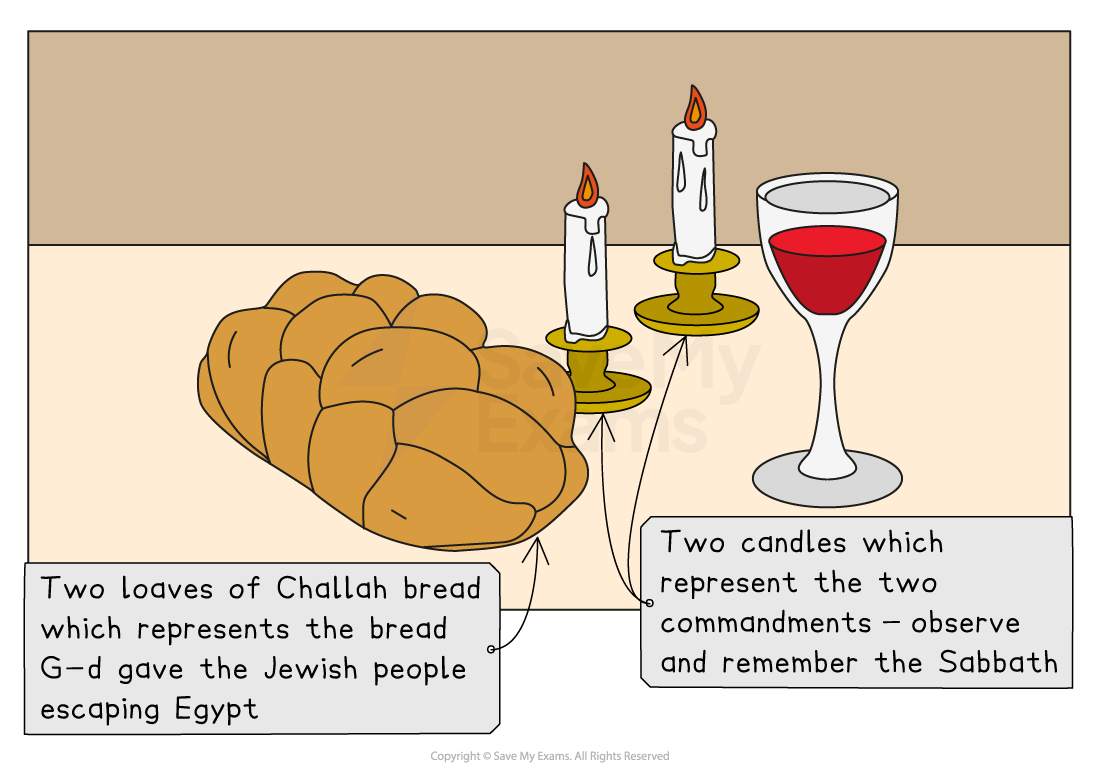Judaism & Worship in the Home (WJEC Eduqas GCSE Religious Studies): Revision Note
Exam code: C120
Worship in the home
What is daily private prayer in Judaism?
Praying in private is important to many Jewish people
Some Jews may even believe that it is not necessary to attend the synagogue daily and choose to pray at home instead
There are many different ways in which private prayer can take place
Jews often pray as soon as they wake up, using water to purify themselves for the day ahead
Many Jews aim for a recitation of a morning prayer called the Modeh Ani to be the first thing they do upon waking
Waking in the morning means that God has chosen to return the soul to the body, so the Modeh Ani thanks God for the gift of another day
Before each meal, many Jews bless God and thank him for the food
Before going to sleep, Jews will often say the Shema
Why is daily private prayer important in Judaism?
There are many reasons why Jews might decide to pray privately rather than communally
Private prayer gives Jews the opportunity to speak directly to God in their own words
It helps Jews develop a personal connection with God beyond formal synagogue services
Jews are expected to pray three times a day, and it might not be convenient or possible to attend the synagogue or form a minyan
Private prayers help Jews to pause and reflect on their individual actions, life and faith
Daily private prayer encourages discipline and strengthens faith
Private prayers might help Jews live by the mitzvot (commandments) and stay connected to Jewish identity
Preparing for and celebrating Shabbat
What is Shabbat?
Shabbat is a day of rest for Jews
It originates from the creation story, as told in Genesis, which says that God rested on the seventh day after creating the world
This idea is also repeated in the book of Exodus:
“It is a sign forever that in a six day period, God made heaven and Earth, and on the seventh day he rested” (Exodus 31:17)
The day also connects Jews to their ancestors, who were enslaved
Not working on Shabbat is a sign of freedom for Jews
During Shabbat, Jews are expected to rest and spend time with their family
On Shabbat, Jews are forbidden by Jewish law from taking part in several categories of work
These include creating or extinguishing fire, writing and repairing things
Many Jews will also avoid all other kinds of work
What happens during the Friday night meal preparation?
On Friday evening, the focus of Shabbat is a meal that brings the family together
All food for the Friday night meal (and usually Saturday meals) is prepared in advance, as cooking is not allowed during Shabbat
A festive table is set with a white tablecloth, candles, wine or grape juice, and challah bread covered with a decorative cloth
The day of rest is welcomed with the lighting of two candles
Traditionally, the mother of the family places her hands over her eyes and recites a blessing
Before eating the food, more blessings are said for the children, and kiddush is said over the wine to make the evening holy
Drinking wine shows that it is a joyful, celebratory time
The challah is blessed, and everyone takes a piece

What happens during the Havdalah ceremony?
Havdalah (meaning separation) marks the end of Shabbat and the start of the new week
It’s a brief, symbolic ritual held after nightfall on Saturday
The Havdalah cup of wine is filled to overflowing as an expression of hope, and blessings are said
Over wine — blessing for the fruit of the vine
Over spices — smelled to comfort the soul
Over the candle — thanking God for the light of fire
Havdalah blessing — praising God for distinguishing between holy days and ordinary days
A braided candle with a double wick is used for the ceremony, and a spice box is taken into each room of the house
The hope is that the week to come will be as sweet as the smell from the spice box
The meal usually lasts for a few hours, with everyone enjoying family time, often singing songs and telling religious stories
There are certain rituals that mark the end of the ceremony
The candle is extinguished in the wine
Some dip their fingers in the wine for a symbolic blessing
Traditional songs, such as “Eliyahu HaNavi”, are sung
Worked Example
Give two reasons why worship in the home is important for Jews
[2 marks]
Answer:
It helps families to pass on faith and tradition to their children [1 mark]
It keeps God at the centre of daily life, not just in the synagogue [1 mark]
Examiner Tips and Tricks
Be ready to explain and give examples of:
Daily prayer (morning Modeh Ani, blessings before and after food, Shema at night)
Shabbat in the home (candles, Kiddush, challah, family meal)
Keeping mitzvot (kosher food laws, mezuzah on doorpost)
Festivals celebrated at home (Passover Seder, lighting Hanukkah candles)
Family and education (teaching children the faith at home)
Tip: Link each practice to beliefs (e.g. keeping mitzvot shows obedience to God’s covenant)

Unlock more, it's free!
Was this revision note helpful?
